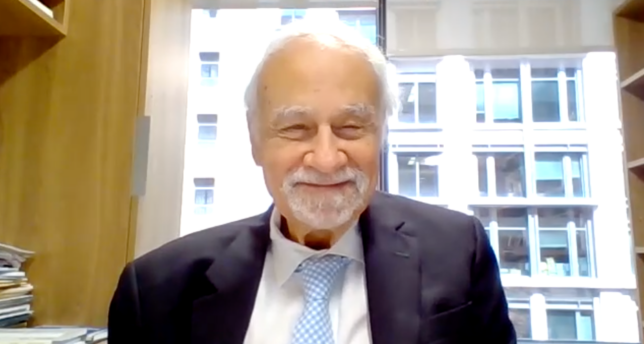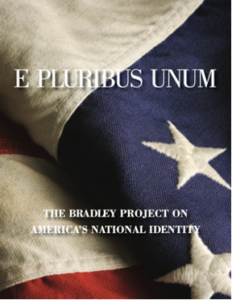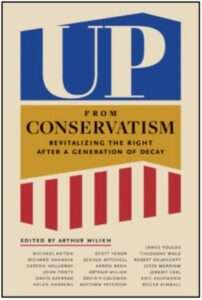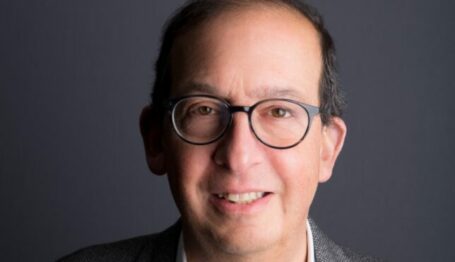Philanthropy
A Conversation with the Hudson Institute’s John Fonte (Part 1 of 2)
The historian, researcher, and teacher talks to Daniel P. Schmidt and Michael E. Hartmann about history and civics education, successful efforts to change the American narrative, and the risks of what he calls “conservative accommodationism” in the necessary attempt to rediscover a genuine one.


We have known John Fonte for a long time, and respected his scholarship, analysis, and refreshingly straightforward way of framing and addressing issues for even longer. A senior fellow at the Hudson Institute and director of its Center for American Common Culture, Fonte researches and writes about history and civics education, citizenship and immigration, and international organizations, among other things.
He has been a visiting scholar at the American Enterprise Institute, where he directed the Committee to Review National Standards under the chairmanship of Lynne Cheney; a senior researcher at the U.S. Department of Education; program administrator at the National Endowment for the Humanities (NEH); and principal advisor for CIVITAS: A Framework for Civic Education, funded by the Pew Charitable Trusts.
Fonte was nominated by the President in 2018 and confirmed by the U.S. Senate in 2019 to serve on the National Council on the Humanities, which advises the chairman of the NEH. His term is now over.
Fonte worked very closely with us on The Bradley Project on America’s National Identity—the final report of which, E Pluribus Unum, was issued in 2008—and his Sovereignty or Submission: Will Americans Rule Themselves or Be Ruled by Others? was published by Encounter Books in 2011. Sovereignty or Submission won the Intercollegiate Studies Institute’s annual Conservative Book of the Year award in 2012, is being published in Sweden this year, and will soon be published in Hungarian.

In “Rediscovering a Genuine American Narrative”—his contribution to the new Up From Conservatism: Revitalizing the Right After a Generation of Decay, also from Encounter—Fonte writes that “the entirety of the American story or ‘narrative’ is interpreted for Americans by the progressive Left” and “is promoted by powerful forces through billions of dollars, physical intimidation, and moral blackmail.” It “seeks to delegitimize the Founders and therewith historical America,” he forthrightly notes. “This is a hill on which the American Right must fight.”
Fonte was kind enough to join us for a conversation earlier this month. The edited, almost 13-and-a-half-minute video below is the first part of our discussion; the second is here. In the first part, he talks about history and civics education, successful efforts to change the American narrative, and the risks of what he calls “conservative accommodationism” in the necessary attempt to rediscover a genuine one.
In recent years, we have seen the development of what can be called a progressive narrative of America, Fonte tells us. “Essentially, it’s a narrative of systems of oppression. There’s a dichotomy in America. There’s a group, we could call them the oppressors—white, male, heterosexual, and so on—and everybody else is the oppressed, or the marginalized. … This is what comes to us today from leading historical groups.”
Fonte continues:
This is how they’re presenting American history, and this is spread widely throughout the education establishment. This is sort of, you might say, the dominant narrative among professional educators—that would be state and local officials and members of the education bureaucracy. They’re presenting a narrative that is rather different from what historically has been the American story ….
This essentially false narrative … should be countered. There should be a counter-narrative to it. We should present essentially an alternative.
He adds, “That’s really not rather hard to do because the material is already there” and cites some specific examples.
In the conversation’s second part, Fonte talks more about some of that material, including from The Bradley Project in ’08, and what’s happened to America’s national identity since then. He also expands upon the risks of “conservative accommodationism”—including in philanthropy—and the need for conservatives to provide a counter-narrative to progressivism’s false one about America.
This article originally appeared in the Giving Review on July 31, 2023.



